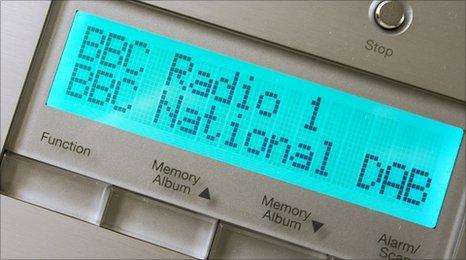Fine tuning the 'senior service'
- Published

Some parts of Scotland cannot pick up digital signals
Analogue television is being switched off across Scotland over the next year in a process which has so far gone without a hitch.
But switching the medium some refer to as the "senior service" to digital raises new challenges.
The UK government is keen to see the BBC and professional commercial radio stations leave FM by 2015.
It has avoided naming this date as a deadline. They want the process to be driven by consumers.
UK Arts Minister Ed Vaizey has pledged that FM will not be turned off until two key targets are met.
First, the digital signal will have to be as widely available as the FM signal is at the moment.
Second, the vast majority of listeners have voluntarily switched to digital.
New radios
Some of the challenges affect listeners and the radio industry across the whole of the UK.
Listeners will need to be persuaded to gradually buy new radios, including car radios, which receive the digital signals.
But other challenges may have a particular Scottish dimension.
For instance, in many remote, thinly-populated areas the FM signal is still poor and being improved.
The digital signal would need to cover some parts of the land mass which are less densely populated - such as stretches of the A9 - to ensure drivers could still listen to their digital car radios.
The BBC has another practical challenge. It's UK-wide radio stations are all available on digital along with extra services such as 6 Music.
Before FM could be switched off, it would also need to find a way of ensuring all Radio Scotland's current services are available on digital too.
At the moment, only the programmes scheduled for the station's medium wave service are broadcast on the DAB digital system.

The government has indicated small stations could remain on FM
Assuming that Radio Scotland is still running a schedule similar to the current one at the time of switchover, the BBC would need to find a way of ensuring the station could still offer a choice of listening at certain times of day, replicating the current split between the station's FM and medium wave services.
The local news bulletins outside central Scotland, which aren't currently broadcast on the digital system either, would need to be made available too.
But concerns over the future of small, community stations appear to be groundless.
The government has indicated that small local stations and community stations - the likes of Argyll FM and Lochbroom FM - would be able to remain on FM for as long as they wanted to.
However, major commercial stations such as Clyde 1 and Moray Firth Radio would have to come off FM, just like BBC services.
Those who claimed that the government and professional broadcasters wanted to "take away FM", deprive some listeners of their favourites and shut down community stations may be silenced by the clarification now being given.
It is an irony that some 20 years ago, similar comments were made when the BBC's main music stations stopped transmitting on medium wave and became FM only.
But the broadcasting industry, manufacturers and retailers will have a lot of work to do to ensure the conditions for switching off FM and making professional radio in the UK a digital-only medium are met.